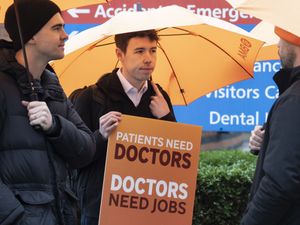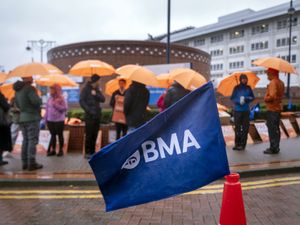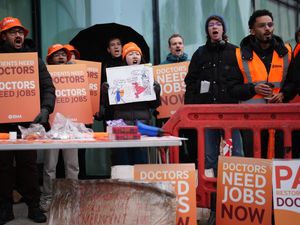Appeal after Round Oak Steelworks minister's asbestos death
A church minister who regularly visited the former Round Oak Steelworks has died from asbestos-related illness.
The family of Rev William McLarnon Lynn believe his sudden death, aged 74, from mesothelioma, was down to his visits to the former steelworks in Brierley Hill during the 1970s.
An ordained minister at Brierley Hill Methodist Church, Mr Lynn would visit the site – now home to the Merry Hill shopping centre – every two weeks to meet with workers and directors as part of the Black Country Urban Industrial Mission between 1974 and 1979.
This involved church leaders going into the steelworks to speak with staff about their lives.
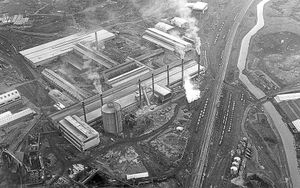
During that time it is believed he would have been exposed to asbestos used in equipment for ovens, furnaces and steel pipes overhead at the sprawling site that at its height employed more than 1,000 people before it shut in 1982.
In a statement before his death to solicitors father-of-two Mr Lynn, who had since moved to the Wirrall, said of his visits to the steelworks: “I was only provided with a hard hat as were the rest of the party taking part in the visits.
"Because of the level of heat being there felt like being in Dante’s Inferno. I was close to the process of steel making which involved the pouring of molten metal.
“Nobody ever wore respiratory protection, masks, respirators or anything of that kind. There were no health and safety procedures or checks or briefings.”
Now his wife Barbara and his family have called upon workers at the steelworks to come forward in their bid for justice.
Tragedy of minister's visits to Round Oak
It was at the heart of steel production throughout the country.
Founded in 1857 by Lord Ward, later the Earl of Dudley and employing thousands of workers at its height – there is much to be proud of about the former mighty Round Oak Steelworks.
But there is another tragic legacy of industrial sites like Round Oak, which have caused heartbreak for families like that of the late Methodist minister Reverend William McLarnon Lynn.
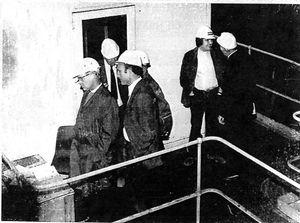
The father-of-two died, aged 74, from asbestos-related disease with his family convinced it was caused by his visits to the steelworks in Brierley Hill in the 1970s.
Up to 3,000 people were employed at the site, with workers often being visited by chaplains from The Black Country Urban Industrial Mission – which offered a range of support. Mr Lynn, of Brierley Hill Methodist Church, was among others to visit steelworks in the 1970s, chatting to workers every two weeks.
Mr Lynn visited workers to understand what made them tick – and to build up a picture of the total operation of the company.
Most conversations took place over the noise of the heavy machinery, or during breaks, with the chaplain helping people with personal problems and learning about industry issues. The industrial chaplains were gathered from different church denominations across the area, but functioned together as one team for work purposes.
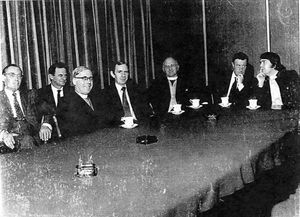
But there were hardly any health and safety procedures or checks, Mr Lynn told solicitors before his death, after he developed an asbestos-related illness.
He died in February this year from mesothelioma and his family are now calling for workers to come forward.
Mr Lynn, who remained a minister in the area in his later years, said in a statement given to solicitors before his death: “Wherever I went I went unaccompanied.
“There were no health and safety procedures or checks or briefings.
“I can recall when speaking to the various members of the workforce to ask them to explain how the steel making process took place.The closer you got to the furnaces the noisier it became – there were at least two furnaces operating all the time.”
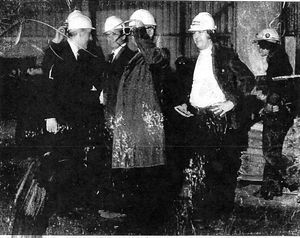
Figures from the Health and Social Care Executive show more than 5,000 asbestos-related disease deaths take place each year. Expected deaths from mesothelioma are expected to hit around 2,500 per year, with the figure due to remain the same over the next few years, before declining. All asbestos-related diseases take years to develop, with current figures reflecting the “legacy” of past working conditions.
About 20 tradesmen die each week as a result of past exposure, with the material still potentially present in any building refurbished before 2000. It comes after father-of-two Roger Burgess, aged 58, died after asbestos exposure which was linked to the former Round Oak Steelworks in Brierley Hill from 1968 to 1981.
Mr Burgess died in 2009 after being diagnosed the previous September.
The majority of iron-making in the world was supposedly carried out within 20 miles of Round Oak.
And there is no doubt the West Midlands once led the world in steel production – with Alfred Hickman works in Bilston and Patent Shaft in Wednesbury, employing thousands of workers.
For the first few decades, Round Oak Steelworks produced wrought iron before shifting to making steel in the 1890s.
The metal of choice was chosen due to its durability, with the 15-acre Round Oak Ironworks – as it was known then – becoming a famous landmark until its demolition in 1984.
The steelworks was nationalised in 1951, privatised in 1953 and nationalised again 1967 – although the private firm, Tube Investments, continued to part manage the operations at the site. It ceased operations and was shut down in December 1982.
The works were demolished and replaced by the Waterfront office complex, part of the Dudley Enterprise Zone in the 1980s, which saw the creation of the Merry Hill shopping centre on neighbouring farmland.
Norman Jones, from solicitors Percy Hughes & Roberts, said: “Steelworks have no excuse for the deceased not being warned about the presence of asbestos.”

